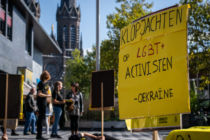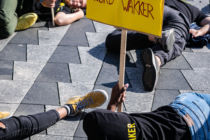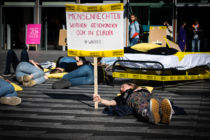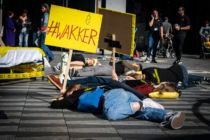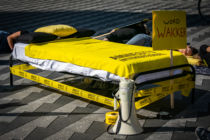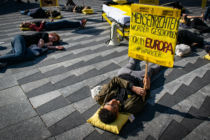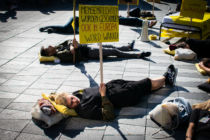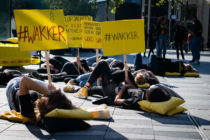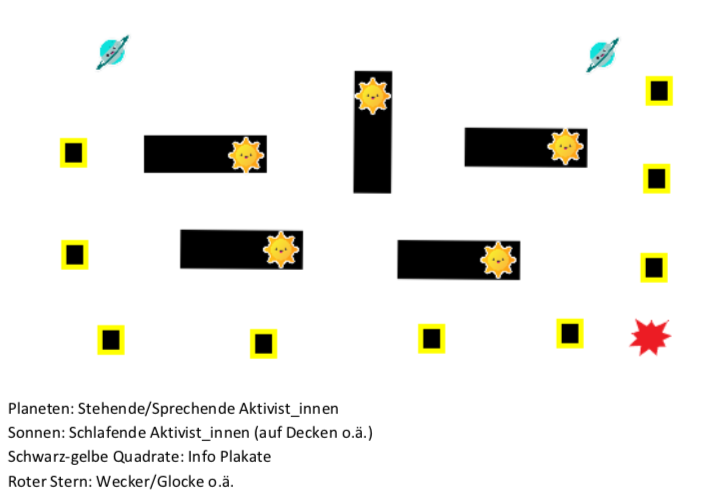For the German site, visit https://amnesty-jugend.de/jugendaktionswoche-2019/
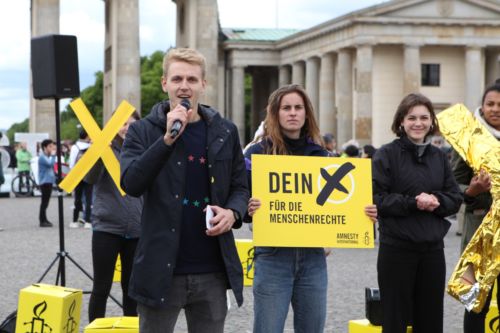
Wake-Up Action am 14.05.2019 in Berlin zur EU-Wahl © Jan Petersmann
We are the European Amnesty Youth Action – a network of young Amnesty activists from all over Europe who started a campaign to draw attention to the human rights violations in Europe and by European states – and we want to call on everyone to act for themselves, for example by your vote in the European elections! Therefore, we will perform an Europe-wide Youth Action Week which will take place from May 11 until May 19, 2019. Young people all over Europe will get active to claim a Europe based on solidarity, humanity and dignity where everyones rights are protected!
InhaltsverzeichnisEvents
Be part of the European Amnesty Youth Action!
You want to take part in the EAYA? There are lots of ways to do so:
- Visit one of the events all over Europe
- Follow us on Facebook and Instagram and check the Hashtags #vote4humanrights and #turnitup
- Join our broadcast channels on WhatsApp and Telegram to stay updated on our actions and human rights in Europe.
- Telegram: Just follow this link: https://t.me/amnestyeurope WhatsApp: Simply add the number 0049 152 236 542 05 to your contacts and write a message!
- Find an Amnesty group near you and organise an event with them.
- Let yourself be inspired by our action ideas for your own event.
- Find out more about human rights in Europe on this website
- Talk to friends, family and acquaintances about human rights in Europe and the elections.
Human rights in Europe
- We want a Europe that upholds equal rights, strengthens social cohesion and is strong against racism, exclusion and discrimination. A Europe that protects people in need rather than closing borders, strengthening and defending the rule of law and freedoms. A Europe that lives up to its responsibilities in the world. A Europe that actively promotes and defends human rights globally and does not violate human rights in the world.
These issues play a role here:
- Economic and social rights
- Non-discrimination
- Rights of lesbian, gay, bi-, inter-, transsexual and queer people (LGBTIQ*)
- Migration
- Climate change
- Threat to civil society (shrinking spaces)
The European elections
Elections to the European Parliament will take place from 23 to 26 May across Europe. Anyone who is a citizen of a Member State of the European Union and is at least 18 years of age is eligible to vote.
Find out when and where you can cast your vote: http://spaceu2019.eu/
Why are the European elections important for human rights?
In some EU countries, there is currently a trend to increasingly restrict the scope for civil society to act. A partly openly racist policy is more and more supported. In many places a policy is made according to the motto „we against them“. Against this background it could be that parties with discriminatory and anti-human rights positions get more seats in parliament than ever before – they are currently investing a lot of time and resources in this goal.
Unfortunately, a low turnout is to be expected. It is to be feared that a low turnout will increase the proportion of votes cast by parties with openly racist and anti-human rights programmes and positions, or that these parties will manage to mobilise many voters.
We see the European elections as an important opportunity to focus the debate on a vision of Europe based on human rights, solidarity, equality and dignity.
The outcome of these elections will be one of the factors that will determine the importance of human rights for the European level in the coming years. We hope that a European Parliament will consist of Members who are committed and feel a universal obligation to uphold and promote human rights at home and abroad and who are willing to hold other EU institutions accountable if they do not.
The European Parliament
The European Parliament consists of representatives directly elected by EU citizens. It therefore represents our interests in the EU. The Parliament decides on the EU budget and is involved in legislation. These are laws and directives that apply throughout the EU and therefore affect your life and mine every day. As within nation states, there are also parties at European level that unite to form parliamentary groups in Parliament.
Find out more about the parliament and the elections on the website of the European Parliament:
https://www.european-elections.eu/how-elections-work
Our Actions
Wake Up Flashmob
- Wake Up! Action in Belgien, © Emma Haverdings
- Wake Up! Action in Belgien, © Emma Haverdings
- Wake Up! Action in Belgien, © Emma Haverdings
- Wake Up! Action in Belgien, © Emma Haverdings
- Wake Up! Action in Belgien, © Emma Haverdings
- Wake Up! Action in Belgien, © Emma Haverdings
- Wake Up! Action in Belgien, © Emma Haverdings
- Wake Up! Action in Belgien, © Emma Haverdings
When? 14th of May
Where? public places frequented mostly by young people. Examples: universities, public squares,…
Main goal: Create consciousness among young people about:
- Current human rights violations (HRV) taking place in Europe and/or created/influenced by Europe/the EU;
- The solutions the EU can implement to lower/stop those HRV;
- The importance of their vote in the upcoming European Elections;
- Their power to hold the EU accountable for HRV and to demand that Human Rights (HR) are prioritized in the EU’s policy.
Basic description
We start with the premise that our society, the European society, is not paying attention – as if everybody was sleeping; sleeping although HRV that are taking place now, in European soil and every day. But change is possible: people can wake up, stand up and together raise their voices against the HRV happening all over Europe. They can become active for a change: voting for HR.
With this action we are portraying that sleeping society as it goes through a process of waking up to those violations, become aware of what the solutions might be and become active towards change: voting for HR.
Hence, we propose a street performance in which there are activists pretending to be sleeping on the ground/mattresses/beds/etc.i and two activists standing. The role of these last two activists is to wake up those asleep: one says the HRV as if he/she was telling the daily news, and the second says possible ways of solving such problems. As they convey this information, the sleeping activists wake up, listen and, at the end, stand up and raise cards with a cross sign (like a vote on a voting ballot) while shouting: “vote for human rights”.
NOTE:
This action mentions a lot of phrases. Mind that we suggest them in English, but you should translate them to your country’s language(s).
From this point on, we present two versions: a simpler one and a more developed one. The first consists in what all groups must do, and the second of a suggestion for those groups who have the resources to do a little more.
BASIC/SIMPLE VERSION a.k.a. the must-do version
Duration: 20-30min
Number of people: 2 activists standing, at least 3 activists “sleeping”
Materials:
- Beds/mattresses/blankets/etc.
- Poster with the cross sign (one for each sleeping activist)
- Poster with info (more info later in the document)
- Megaphone (if possible, one for each of the 2 activists standing) or another sound system – this is just a suggestion for them to be heard, it’s not mandatory
- Bell/alarm/musical instrument/etc. (more info later in the document)
- Amnesty International’s identification for each activist
Procedure:
At the beginning, the activists are in their positions, similarly to the disposition in Picture 1.
Picture 1: Wake Up! Action, example of activists’ positions. Seen from above Caption: Planets: standing activists who inform the sleeping activists Suns: sleeping activists Black rectangles: beds/mattresses/etc. (bed will be used as a simplification) Black and yellow squares: posters with info (info-posters will be used as a simplification – Picture 3) Red star: bell/alarm/musical instrument/etc. (bell will be used as a simplification)
- The bell rings
- One standing activist starts to tell the news. The phrases must be short, clear and have an impact. Examples:
- In 2017, in just 4 months, more than 1000 people died trying to cross the Mediterranean.
- As of January 2019, only 8 European countries recognised that sex without consent is rape.
- There are countries in the EU in which the work of NGO’s is illegal.
- Meanwhile, the sleeping activists wake up. They yawn, stretch, …
- The second standing activist starts to talk, presenting solutions. These must also be clear, small and simple phrasesii. Examples:
- The EU must create safe and legal routes for refugees.
- The EU must create opportunities for refugees and sponsor communities who welcome refugee people.
- Meanwhile, the activists sit on their beds listening and showing surprise with the news and nodding to the solutions being presented to them.
- Suggestion: use Amnesty’s flags as bed sheets to make the connection of your action with AI.
- The activists get up from their beds and rise posters with a cross, representing a vote and shouting: “vote for human rights”. Suggestion: If you don’t want to print cards, you can make them! Each activist makes their own card by hand, representing their own vote. It is important to have squared white cards with a black lined square/circle (according to how the vote looks like in your country) and then, with a bold pen, each activist would draw the cross as they would do if they were voting, only in a bigger scale. For this, the activists can use only a blue or a black pen, to be realistic.
- The action is over. The activists go back to sleep. We recommend doing this performance 3 or 4 times in a row.
Around the scene, there will be info-posters displayed on the ground for people to read between performances. This boards must be identified with AI’s logo, the campaign’s # and the information we want to give people about the HRV taking place in Europe and, below, the solution that AI is presenting. Each card has a different information.
GETTING READY FOR THE WAKE UP! ACTION:
- Choose the aspects you wish to talk about considering Amnesty’s work, this campaign’smain goal and your country’s political contextii
- Prepare your activists: give them all the information needed for this action
- Assign roles to each activist so everyone knows what to do
- Pick an hour to start your action and share it with the other European groups.Remember, the goal of this action is for it to happen roughly at the same time in allcountries, so communicate your ideas with all the other groups in time
- Pick a place to do the performance and guarantee you have all the authorizations andsecurity you neediv
- Collect the HRV you wish to present to the public and the solutions presented byAmnesty Internationalii
- Write down the phrases to be said on the day of the action
- Write down the phrases for the info-posters
- Design and print the info-posters
- Guarantee you have all the materials you need and that you can move them to theplace where the action will be taking place
- Share the event on your group’s and/or national social networks
- Contact social media outlets inviting them to be present and cover the eventPlease share the general info of your group’s action – location, schedule and which activities you’ll be developing – with EAYA until the 30th of April.
Also, remember to advertise your action on social media – we recommend starting to do so no later than 30th of April.
DURING THE WAKE UP! ACTION:
- Make sure everyone is safe and feeling well
- Take pictures and film your action. If you can make some live videos for your socialnetworks.
CLOSING THE WAKE UP! ACTION:
- Share photos and videos online to maximize your impact
- Send some information about the action to local media outlets and other entities thathave an impact in informing the local youth community
- Get feedback from your team (and ideally also from people who engaged in your action)in order to comprehend what went well and what could have gone better. Evaluate to do better next time!
IMPORTANT:
– Please check that this action is compatible with the campaign messaging in your section, to ensure it is aligned with the section’s calls at the national level – or adapt it accordingly. Note that in some countries Amnesty is not allowed to call on people to vote – and the section will therefore not use the word „vote“.
– Amnesty International does not have a policy on elections per se but calls rather on people to exercise their right to participate in political life in many ways, among which ‘voting’ is one. The campaign aims to mobilise and support more young people to raise their voices, challenge politicians to commit to policies that respect and protect everyone’s rights and vote for societies based on hope, not fear. To avoid giving the impression that the main objective is to just vote, please bear this in mind when calling people to action (e.g. balance calls on „go vote“ with calls on „raise your voice“).
– Amnesty International has always been, and remains, politically impartial. We want any politician or leader, regardless of the system of governance in their country, and regardless of the party they belong to, to uphold human rights. When it comes to language around voting, we must ensure we stick to our impartiality and are not seen as suggesting to people which way to vote. The advice is that the ‘human rights’ element gets mentioned before the actual call to vote. For example, “Raise your voice for human rights, let politicians know you want a better Europe for all. Go vote!”. This way we are not either explicitly or implicitly telling people how to vote. We know it is a tricky one to navigate semantically, but we must foremost try to ensure we are not perceived as not impartial in any way.
LONGER VERSION a.k.a. the “we can do a bit more” version
This version is similar to the basic version with the exception that it takes a longer period of time and has interactive parts. With these later parts, we are trying to understand what people’s needs and desires towards the EU are, and also make them participate in this action. You don’t need to use them all if you don’t think it will be possible for you. To prepare and imagine the version read everything above and just add the following info.
Duration: 3 – 5 hours (so that more people can see and interact with it. Be as much time as you can.)
Materials:
- All of those needed for basic version
- Ballot box(es)
- Pen and paper (for the opinion votes)
- Information about the Vote at the European Union Elections Campaign
- Materials you might need for the interactive table
- Petitions related with the campaign
Procedure: What differs from the Basic version?
- The bell can be activated by the public. We suggest you write a card next to it saying one of the following:
- Ring the bell if you want change
- Ring the bell for society to WAKE UP!
- There will be a big box representing a ballot box. We suggest a transparent big box, orseveral smaller transparent boxes. The box(es) would be labelled: “The EU must…” and next to it there will be a stack of papers for people to write down their suggestions and then fold them and put them in the ballot box(es)., thus representing the vote. We suggest transparent boxes so that people can see the interior of it and the “votes” stacking on each other. This part is independent from the rest of the action but shows how each and every one of us must act to make a difference.
- Interactive Table: in this table the objective is to make people pledge to vote for human rights. You can have picture frames, the photo petition EAYA is preparing, materials so that people can make a cross with those materials, … use your imagination!
- Information desk: have information you can share with people about the campaign and petitions people can sign related to it.
Description:
The action takes place in two different ways:
- periodically, every 15-20 minutes
- every time someone from the public rings the bell.
This 20-minute period was thought so that the activists involved would have time to rotate positions if needed, rest, talk to the audience and inform them, and to allow people to ring the bell if they want.
ATTENTION: The following segments only present the things you need to do specifically for this version, i.e., you must also check all the things previously written in the basic version section.
GETTING READY FOR THE WAKE UP! ACTION:
- Organize shifts and decide which person is responsible for each shift
- In this version, as you will be having more time at the scene, make sure everyone isready and informed
- You may want to have someone to help people in the ballot box
- If you decide for the information desk and interactive table, make sure there are atleast two activists there at all times.
DURING THE WAKE UP! ACTION:
Talk to everyone around you and invite them to participate. There are several ways they can do it: writing down their opinion for the ballot box, ringing the bell, taking a picture, etc. Remember that the opinion is anonym and will always remain so.
CLOSING THE WAKE UP! ACTION:
- Share the pictures people took with the frames. You can create an album on yourFacebook profile just for that, for example. ALWAYS use the campaign’s #
- Collect the opinions people wrote in the ballot box and find a creative way of sharingthem. Instagram stories is a good way, your event’s photos descriptions also
- Share all content with the EAYA social media accounts.GOOD LUCK!
ATTENTION: Please be safe.
Depending on where you are, we recommend you take care of your safety and of those around you. Have someone to just be aware of the public and act in case someone appears and tries to create a problem, ask for the police to be there, etc. AI has a specific document called Safety During Protest.
Europe@Lunch
What is it about?
You invite people to a big banquet, if possible at a public place, to eat together. Bring some food and passers-by might join. You share, eat and conversations start. Additionally there will be Information about the EU, Human Rights and why the upcoming elections are so important. The goal is to inform different kinds of people in a relaxed setting.
What do you need?
- A table and chairs to setup at a public place where a lot of people come by, like a market place, a sight, a university-campus or in a park.
- Food: Amnesty cannot cover the costs, but you can ask people to bring their own food, bring something to share and prepare something in your group.
- Plates and cutlery: Try not to use plastic or single use dishes.
- Information material: There will be material concerning the EU and Human Rights. Creative gimmicks like stickers and beermats are also planned (contact us to order them!). You can advertise other actions you are planning.
- The organisers should be discernible, for example through an Amnesty-shirt or keychains. This is Important that people know who to ask questions.
What is important for planning and execution?
- Please speak to your local authorities to register the event (if necessary)
- Advertisement: Try to break out of your bubble. Advertise at hostels, schools etc.
- Work together with others: Organize the banquet with other groups or invite them, the more the merrier. Ask refugee organisations, cultural clubs or more to join you in planning or just to come.
- Divide and assign the tasks: When you want to have a good time it´s important that the tasks still get done, so make sure everybody knows what he or she is doing: Who welcomes people? Who shares information material? Who starts talking about the EU with people? Does someone do a short speech/presentation? Who takes photos?
- Take pictures of your banquet and post them with the following hashtag:…
- Please also send it to the EAYA-Channels. We will post them on our social media channels then.
For questions, comments and ideas you can reach us via: aktionen(at)amnesty-jugend.de
My Vision for Europe
What is it about?
You invite people to a big banquet, if possible at a public place, to eat together. Bring some food and passers-by might join. You share, eat and conversations start. Additionally there will be Information about the EU, Human Rights and why the upcoming elections are so important. The goal is to inform different kinds of people in a relaxed setting.
What do you need?
- A table and chairs to setup at a public place where a lot of people come by, like a market place, a sight, a university-campus or in a park.
- Food: Amnesty cannot cover the costs, but you can ask people to bring their own food, bring something to share and prepare something in your group.
- Plates and cutlery: Try not to use plastic or single use dishes.
- Information material: There will be material concerning the EU and Human Rights. Creative gimmicks like stickers and beermats are also planned (contact us to order them!). You can advertise other actions you are planning.
- The organisers should be discernible, for example through an Amnesty-shirt or keychains. This is Important that people know who to ask questions.
What is important for planning and execution?
- Please speak to your local authorities to register the event (if necessary)
- Advertisement: Try to break out of your bubble. Advertise at hostels, schools etc.
- Work together with others: Organize the banquet with other groups or invite them, the more the merrier. Ask refugee organisations, cultural clubs or more to join you in planning or just to come.
- Divide and assign the tasks: When you want to have a good time it´s important that the tasks still get done, so make sure everybody knows what he or she is doing: Who welcomes people? Who shares information material? Who starts talking about the EU with people? Does someone do a short speech/presentation? Who takes photos?
- Take pictures of your banquet and post them with the following hashtag:…
- Please also send it to the EAYA-Channels. We will post them on our social media channels then.
For questions, comments and ideas you can reach us via: aktionen(at)amnesty-jugend.de
Social Media
- Follow us on Facebook and Instagram and check the Hashtags #vote4humanrights and #turnitup
- Join our broadcast channels on WhatsApp and Telegram to keep updated on our actions and human rights in Europe.
- Telegram: Just follow this link: https://t.me/amnestyeurope WhatsApp: Simply add the number 0049 152 236 542 05 to your contacts and write a message!
- Attention: WhatsApp and Telegram Broadcasting servies are now defunct.


